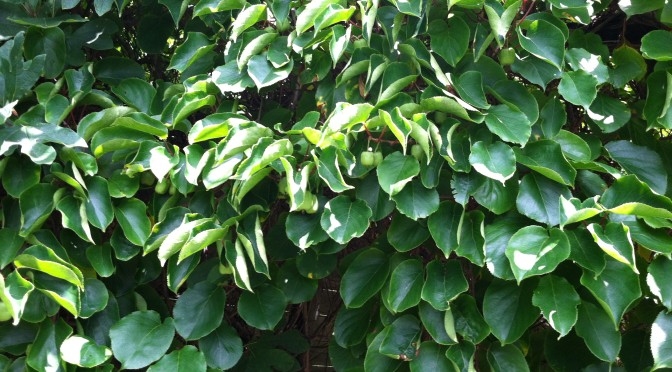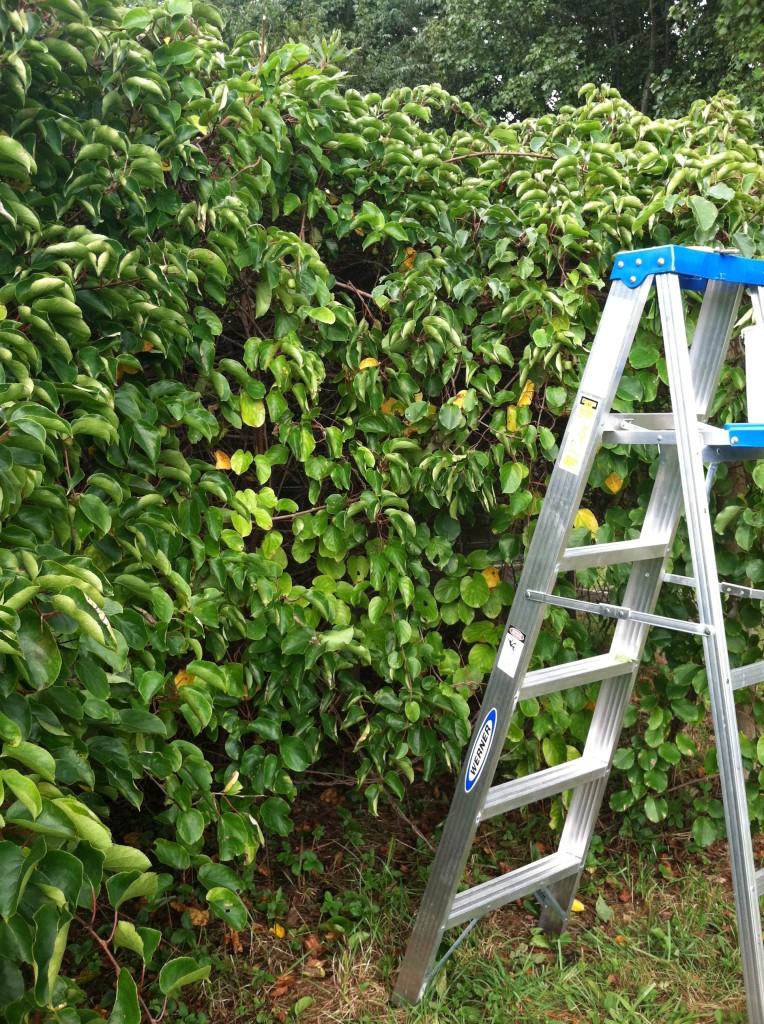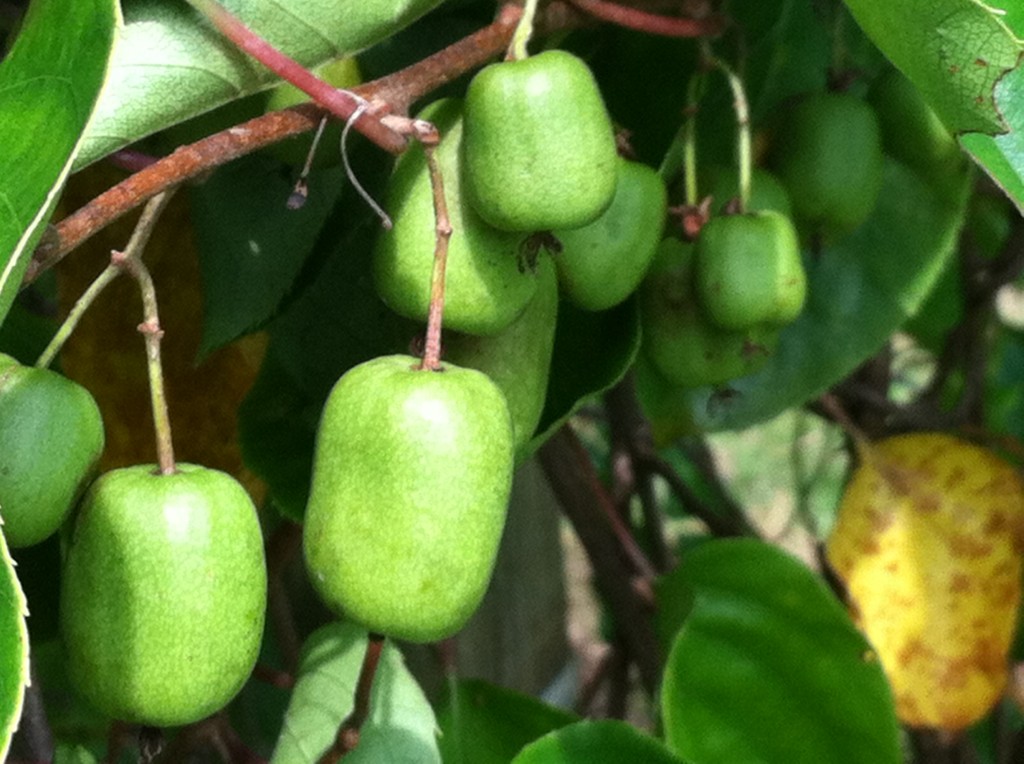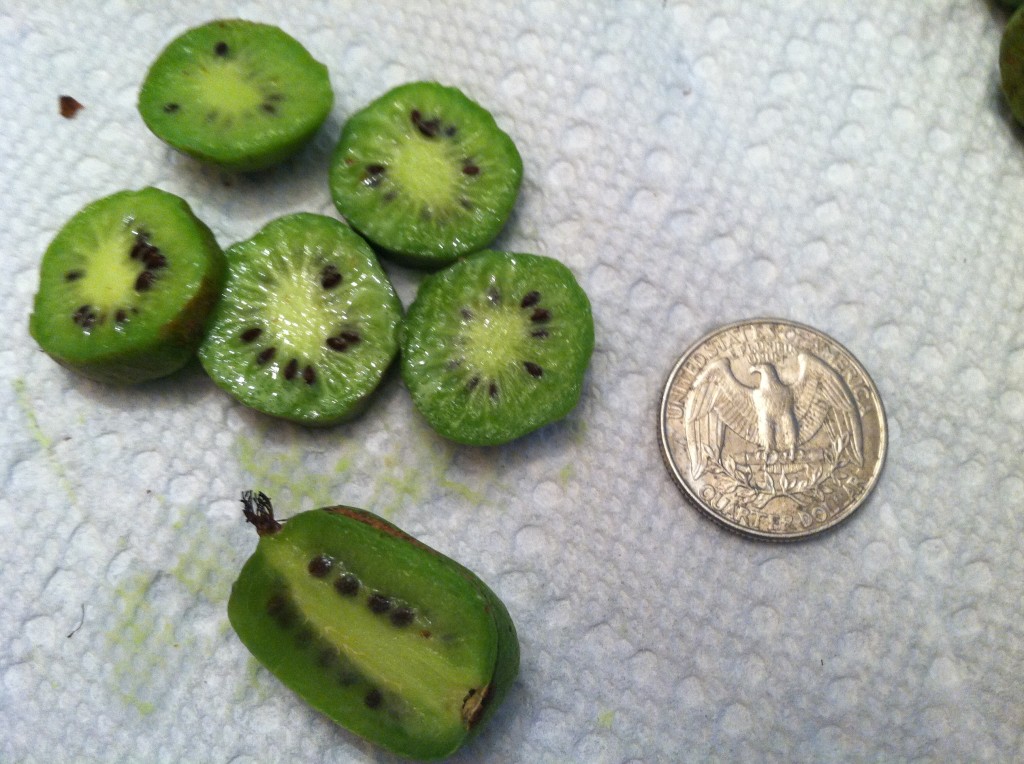Hardy Kiwi were another wonderful discovery that came with the homestead. Also known as "Chinese Gooseberries", Hardy Kiwi is a cousin to the fuzzy kiwi that you may have tried before. They are hardy because not only can the trees stand much colder temperatures than regular kiwi trees, but they grow well when neglected, as they obviously did on the homestead we bought.
There are very specific instructions for how to train hardy kiwi's vine like branches along trellises. Ours came in a huge tangled mess, much like a pile of necklaces with dainty chains that my daughters would periodically hand me and say, "Fix it Mommy." This past Labor Day weekend, I began "fixing" the kiwi pile.
As I traced each vine back and trimmed it according to the instructions (google IS my friend), I also began harvesting the first year of kiwifruit. A single kiwi tree can yield 50-100 pounds of fruit. We have two female trees and one male, I would guess we picked about 30-40 pounds total. I was not disappointed considering they have not been tended to in several years.
Hardy kiwi that is ripened on the vine is quite sweet at a 29% sugar count, but it needs to be consumed or preserved within a week from the time it is picked. When ripe you can pop them in your mouth and eat them like grapes. Unripened kiwi is sour at about 9% sugar, but is able to stay fresh in a fridge for several months and then ripen in a day or two on the window sill. On the vine, the fruit ripens at different rates during the month of September, so there is some flexibility in harvesting schedules.
We ate plenty of the fruit as snacks but also experimented with canning in several jams. Both the kiwi/strawberry and the kiwi/blueberry jams turned out wonderful and have been great gifts to share with others.
Sweeter than the grocery store fuzzy brown kiwi, hardy kiwi can be grown in most areas of the United States and many other climates in both hemispheres. (Please note you need both male and female trees present to produce fruit.) An excellent choice for a perennial, I would recommend hardy kiwi to anyone considering adding self perpetuating healthy fruits to their home gardens.
Read more:
Kiwi is also a great ‘prebiotic’ food. Prebiotic nutrients help to feed the probiotic bacteria in your gut (these bacteria are essential for optimal health). This helps keep digestive health in check while also helping to prevent a number of health issues. Here are over 9 kiwi fruit benefits. http://naturalsociety.com/kiwi-fruit-benefits-health-natural-immune-system/
Have you tasted these remarkable miniature kiwis yet? Every bit as delicious as the larger, more familiar fuzzy kiwi, hardy kiwis are much easier to grow and eat (skin and all). And just about every home gardener in North America can grow them. Hardy kiwi is a catchall term for types of kiwis (Actinidia) that, when dormant, can survive temperatures as low as -40° F (USDA Hardiness Zone 3). These beautiful, vigorous natives of Russia, China, Japan, and Korea have deep green leaves and long whiplike vines that can grow as much as 20 feet in a season. In the wild, they may climb 50 feet or more into treetops. http://www.garden.org/articles/articles.php?q=show&id=656
As implied by the name and the native habitat, this plant can tolerate cold. Plants generally are hardy to about -25˚F (adapted to USDA Hardiness Zones 4 through 7), and require about 150 frost-free days to ripen their fruits. The fruit itself looks quite different from that of the grocery store kiwifruit. Hardy kiwifruits are smaller, an inch or so long. Fruits are borne in clusters and have smooth, edible skins so can be eaten just like grapes. The hardy kiwifruit has the same emerald-green interior and similar flavor to the grocery store kiwifruit, except that hardy kiwifruits are sweeter. http://www.organicgardening.com/learn-and-grow/kiwifruit-every-garden
In the world of phytonutrient research, kiwifruit has fascinated researchers for its ability to protect DNA in the nucleus of human cells from oxygen-related damage. Researchers are not yet certain which compounds in kiwi give it this protective antioxidant capacity, but they are sure that this healing property is not limited to those nutrients most commonly associated with kiwifruit, including its vitamin C or beta-carotene content. Since kiwi contains a variety of flavonoids and carotenoids that have demonstrated antioxidant activity, these phytonutrients in kiwi may be responsible for this DNA protection. http://www.whfoods.com/genpage.php?tname=foodspice&dbid=41



